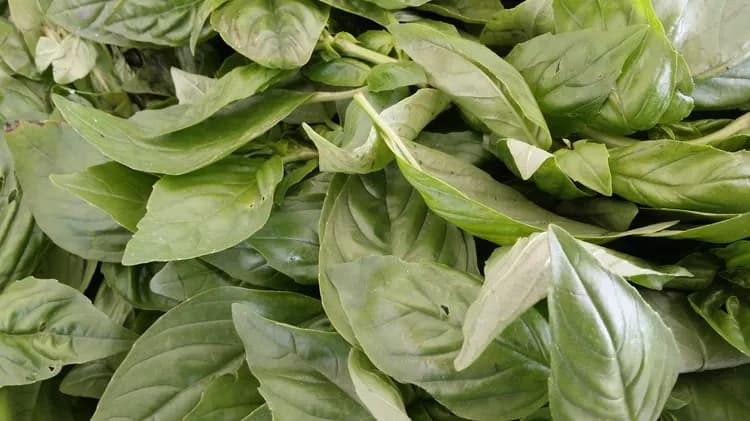Basil, Thai basil, or sweet basil, is a common name for the cooking herb Ocimum basilicum. There are also more than 50 species of basil, but most are not used for any culinary preparations. Originating in India, basil has been used in many cuisines such as Italian, Indonesian, Thai, Vietnamese, Cambodian, Laos, and Taiwanese. The round, often pointed leaves of the fresh basil plant look very similar to peppermint leaves. Its highly fragrant leaves are used as a seasoning herb for a variety of foods, and this traditional herb has many beneficial health effects.
Basil has shown to have anti-aging effects. Researchers from the Poona College of Pharmacy, Maharashtra, India, have suggested that holy basil or Ocimum sanctum, a close relative to sweet basil, has certain compounds that neutralize harmful molecules, thereby protecting the heart, liver, and brain. These chemical compounds can also help keep the body youthful, both physically and mentally.
The same university research informs that basil may reduce inflammation and swelling. Inflammation is the body’s first attempt at protecting itself and trying to heal itself. Too much inflammation is a detrimental thing, and there is ongoing research into the links between inflammation and heart attacks. Extracts from a particular variety of basil, called O. tenuiflorum, reduced swelling by up to 73%, after 24 hours of treatment. Similar results were seen with O. americanum too.
Another nutritional benefit of basil is that it helps improve bone health. Vitamin K, which is present in basil, may play a role in promoting bone growth. It is common knowledge that calcium is essential for good bone health, but vitamin K is one of the compounds necessary for the body to absorb calcium. Therefore, enough consumption of vitamin K makes stronger bones and may assist in delaying osteoporosis.
Studies have also shown that basil may have antimicrobial and antiviral properties. The antioxidants can kill many bacteria and viruses like herpes viruses, adenoviruses, hepatitis B virus, coxsackievirus B1, and enterovirus 71. Some people eat basil because of its use in treating cancer. A study from Chiang Mai University has suggested that sweet basil may hinder growth on human mouth epidermal carcinoma (KB).
For individuals with diabetes, adding some basil to one’s pasta sauce may be an excellent idea. Basil may have blood sugar regulation effects. Holy basil is believed to have blood sugar sinking effects and may be useful as an addition to dietary treatment and drug management in individuals with mild to moderate diabetes mellitus.
Additional Resources:
Bozin, B., Mimica-Dukic, N., Simin, N., & Anackov, G. (2006). Characterization of the volatile composition of essential oils of some Lamiaceae spices and the antimicrobial and antioxidant activities of the entire oils. Journal of Agricultural and Food Chemistry, 54(5), 1822-1828.
Chiang, L. C., Ng, L. T., Cheng, P. W., Chiang, W., & Lin, C. C. (2005). Antiviral activities of extracts and selected pure constituents of Ocimum basilicum.Clinical and Experimental Pharmacology and Physiology, 32(10), 811-816.
Manosroi, J., Dhumtanom, P., & Manosroi, A. (2006). Anti-proliferative activity of essential oil extracted from Thai medicinal plants on KB and P388 cell lines.Cancer letters, 235(1), 114-120.
Pattanayak, P., Behera, P., Das, D., & Panda, S. K. (2010). Ocimum sanctum Linn. A reservoir plant for therapeutic applications: An overview.Pharmacognosy reviews, 4(7), 95.
Tohti, I., Tursun, M., Umar, A., Turdi, S., Imin, H., & Moore, N. (2006). Aqueous extracts of< i> Ocimum basilicum</i> L.(sweet basil) decrease platelet aggregation induced by ADP and thrombin in vitro and rats arterio–venous shunt thrombosis in vivo. Thrombosis research, 118(6), 733-739.
World Health Organization. (2001). The World health report: 2001: Mental health: new understanding, new hope.
Helpful Peer-Reviewed Medical Articles:
Tapsell, L. C., Hemphill, I., Cobiac, L., Sullivan, D. R., Fenech, M., Patch, C. S., ... & Fazio, V. A. (2006). Health benefits of herbs and spices: the past, the present, the future.
McKay, D. L., & Blumberg, J. B. (2006). A review of the bioactivity and potential health benefits of peppermint tea (Mentha piperita L.). Phytotherapy Research, 20(8), 619-633.
Kim, H. J., Chen, F., Wang, X., & Rajapakse, N. C. (2005). Effect of chitosan on the biological properties of sweet basil (Ocimum basilicum L.).Journal of agricultural and food chemistry, 53(9), 3696-3701.
Lee, J., & Scagel, C. F. (2009). Chicoric acid found in basil (Ocimum basilicum L.) leaves. Food Chemistry, 115(2), 650-656.
Jayasinghe, C., Gotoh, N., Aoki, T., & Wada, S. (2003). Phenolics composition and antioxidant activity of sweet basil (Ocimum basilicum L.).Journal of Agricultural and Food Chemistry, 51(15), 4442-4449.
Related Articles
Test Your Knowledge
Asked by users
Related Centers
Related Specialties
Related Physicians
Related Procedures
Related Resources
Join DoveHubs
and connect with fellow professionals


0 Comments
Please log in to post a comment.